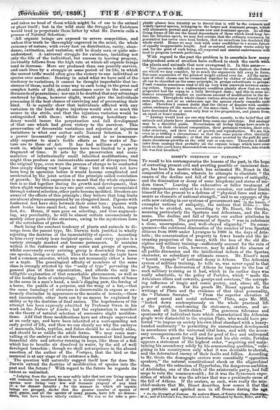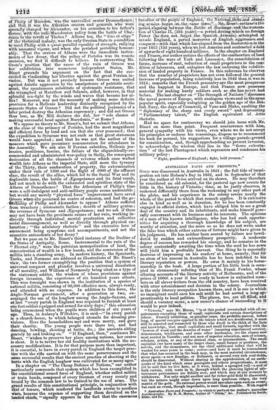IrIf3SET'S' STRENGTH OP NATIONS. * - TO recall to his contemporaries
the lessons of the past, in the hope of correcting present evil and averting possible or imminent dan- ger, has been the motive which has animated Mr. Bisset in the composition of a volume, wherein he attempts to elucidate " the causes of the decline and fall of the great empires of antiquity, and the diminution or decay of some kingdoms and states of mo- dern times." Leaving the exhaustive or fuller treatment of this comprehensive subject to a future occasion, our author limits himself for the present to a defenoe of " physical force and arma- ments as elements of national strength," and to an eIposate of el evils now existing in our systems of government and'. ;1,1 the' hang; :-.e exemplar nations of antiquity, the nations that ilium.. ee. the errors to be avoided, are, according to Mr. Bisset, the Greeks,, meaning particularly the Spartans and Athenians, and the Ito- mans. The decline and fall of Sparta our author attributes to bad government. The government of Sparta " was in substance a close, unscrupulous, and well-obeyed oligarchy." Its conse- quences—the continual diminution of the number of true Spartan citizens from 9000 under Lyeurgus to 1000 in the days of Aris- totle; the concentration of property in fewer hands and the in- creasing pauperism of the many, with the loss of the old dis- cipline and military training—sufficiently account for the ruin of Sparta. To these evils, however, may be added the absence of all public discussion and the intellectual defects of the Spartan, character, as subsidiary or ultimate causes. Mr. Bisset's next " horrid example " of national decay is Athens. The Athenian system of military training, he tells us, was never equal to that of Sparta. The destruction of Athens be imputes to the loss of such military training as it had, which in its earlier days was really admirable, to the policy of Pericles, which " made the Athenians idlers and cowards, gossips and covetous," the corrupt- ing influence of tragic and comic poetry, and, above all, the power of orators. For his proofs Mr. Bisset appeals to the writings of Plato and the evidence of that ideal personality, the " Platonic Socrates." " From the superior elevation of a great moral and social reformer," Plato, says Mr. Mill, "looked down contemptuously on the whole• practical life of the period, condemning its statesmen, orators, and ar- tists, and all its institutions." The generous tolerance and spontaneity of 'individual taste which characterized the Athenian people were distasteful to the utopian Plato, who would have pre- ferred "to impose on society his own ideal standard with a heavy- handed uniformity "' to permitting its unrestrained development in accordance with the universal vital laws, and with the neces- sary accompaniments for evil and for good of free and unlicensed: growth. To a great living historian and his able critic, Pericles appears a statesman of the highest order, "acquiring and main- taining his ascendency solely by his commanding qualities," eulo- gizing in his countrymen only what it was desirable to cherish, and the determined enemy of their faults and follies. According to Mr. Grote the demagogic orators were essentially " opposition speakers,' the natural constitutional check on the oligarchical class. After the ostracism of Hyperbolus, the dangerous ambition of Alcibiades, one of the chiefs of the aristocratic party, had Ur scope to ruin the commonwealth ; for it was the Syraousan expe- dition of which he was the adviser that was a proximate cause of the fall of Athens. If the orators, as such, were really the mis- chief-makers that Mt. Bisset describes, how comes it that the most patriotic and spirited man in all Greece during the age
• On the Btrenpthof Nation*. By Andrew Bisset. of Trinity College, Cambridge, M.A., and of Lincoln's Inn, Barrister-at-Law. Published by Smith, Elder, and Co.
at Philip of Macedon, was the unrivalled orator Deimesthenesi itid that it was the Athenian orators and generals whO were sPocially charged by Alexander, on his accession to his father's throne, with the anti-Macedonian policy from the battle of ChM- ronea to the revolt of Thebes P Athens too, the " fons et origo " of the rhetorical malady, was the only Grecian State in a condition to meet Philip with a quasi-parallel equality of strength, rallying With ancestral vigour, and when she perished .perishing honour- ably. That the orators of Athens were the immediate instru- ments of her 'decay, that the policy of Pericles was its remote occasion, we find it difficult to believe. In controverting Mr. Grote's position that the cause of the ruin of Greece was her subdivision into numerous independent States, Mr. Bisset in his argument on the fact that she suc- ceeded n vindicating her liberties against the great Persian in- vasion. But was it not precisely because Greece was united against Asiatic, aggression by the omnipotence of patriotic senti- ment, the spontaneous substitute of systematic resistance, that she triumphed at Marathon and Salamis, aided, however, in that sPlendid sea-fight by the winds and waves that became her al- lies? Moreover, was not the necessity of making some definite provision for a Hellenic leadership distinctly recognized by the separate States of Greece ? Did not the political jealousies of a later period destroy the Athenian supremacy ; and did not Greece thus lose, as Mr. Mill declares she did, her " sole chance of making successful head against Macedonia," or Rome ?
We oppose no theory to Mr. Bisset's, but we submit that Athens, at the close of the primacy of Pericles, had the most magnificent and efficient force by land and sea that she ever possessed; that the expedition to Syracuse was not such as that great statesman would have approved ; and that he was not the author of the measure which gave pecuniary remuneration for attendance in the Assembly. We ask also if Persian subsidies, Hellenic jea- lousies, pestilent*, famine, the failure of the oligarchically-re- commended and administered war-policy in Sicily, the consequent desiccation of all the channels of revenue which once wafted wealth into Athens as the imperial State, still more the tyranny of the Thirty, their confiscation of property, the extermination
u nder their rule of 1500 and the flight of 5000 of the affluent class, the revolt of the allies, which led to the Social War and its deplorable issue, the battle of 2Egospotamos and its fatal result, W. not much to do with the exhausted and spiritless state of the Athens of Demosthenes ? That the Athenians of Philip's time were a self-indulgent and anti-military people seems undeniable ; but would any merely "physical force" improvement have saved eeee ashen-el-e—possessed no centre of cohesion, and had the ge-
Tsiiip of Philip and Alexander to oppose? Athens suffered from treachery ; aristocratic faction ; dearth of military genius ; the reverses of Syracuse and 2Egospotamos ; and we ask if these may not have been the proximate causes of her ruin, working in- directly through individual mental prostration and collective social discouragement, as well as directly through physical ex- haustion ; "the adulatory rhetoric" and the excessive love of amusement being symptoms and accompaniments, and not the causative antecedents of her decay ?
But we pass on to Mr. Bisset's third instance of the Decline of the States of Antiquity, Rome. Instrumental to the ruin of the " Eternal city," were the patrician monopolization of land, the concentration of wealth in a few hands, and the conversion of the militia into a standing army. In modern history, the Spaniards, Turks, and Normans are adduced as illustrations of Mr. Bisset's view, the two former exemplifying the position that a system of universal conquest and plunder involves a universal dissolution of all morality, and William of Normandy being cited as a type of the statesman soldier, the wisdom of whose provisions against foreign invasion, the experience of six hundred years attests. This wise foresight was shown in the institution of a species of national militia, consisting of 60,000 effective men, always ready, and attended with no expense. In addition to this force, the Anglo-Norman government, after a generation or two, en- couraged the use of the longbow among the Anglo-Saxons, and at last "every parish in England was required to furnish at least one foot soldier equipped and armed for sixty days ;" this education being commenced when the pupils were children of six years of age. Thus, in Aubrey's Wiltshire, it is said—" In every parish is a church-house, to which belonged utensils for dressing pro- visions. Here the householders met and were merry, and gave their charity. The young people were there too, and had dancing, bowling, shooting at butts, &c. ; the ancients sitting gravely by and looking on." "If England, then," continues Mr. Bisset, " wishes to preserve her place among nations, her course is clear. It is to revive her old healthy institutions with the ne- cessary modifications. It is for that purpose more than important, it is essential, to have in every parish in England the target prac- tice with the rifle carried on with the same perseverance and the same successful results that the ancient practice of shooting at the butts with the English longbow was cultivated for so many ages."
In a chapter on " The Cheap Defence of Nations," our author particularly commends that system which has been exemplified in the constitutional armed force of England, whether called militia or train bands, composed of every freeman of every county and bound by the common law to be trained to the use of arms. The grand results of this constitutional principle, in conjunction with that of tenure, which rendered the landlords averse to needless wars, because the expense of supporting them devolved on the 'glided chiefs, " signally appears in the fact that the enormous pooPle or onn Etfglacl; the 1\ an
- ),,•; it? alifa_S•4'.,1114 41g..BrADieS begR•nfiStwOcsi!= t4nqigi-gmsrft. inn tithe period elapsing betw.ean .4s, Battle of -likas4ing4itkuttbuireistnrik ton of Charles II. (59* years)—a periodAluringtwhitikinkfureign Power (he does not forget-,the SpanishArmada) -attempted -1:11 invade England, a period moreover -4 English aggres.sion.,and conquest—with that which has elapsed from the Restoration:to the year 1815 (155 years), when we lost America and contracted a deb.of upwards of eight hundred millions., In the chapter on. England
and France, our author notices the effects of the confiscation of following the wars of York and Lancaster, the consolidation farms, increase of rent, reduction of small proprietors to the. c4014 dition of labourers, and, eulogizes the law enforcing the subdiVi• sion of landed property in France. In this reference he observes that the number of proprietors has not even followed the general increase of population, being relatively less in 1842 than it was in 1815; remarks that the French peasantry are the most prosperous and the happiest in Europe, and that France now possesses material for making hardy soldiers_ such as she has never had before. The last chapter on "The Strength of Nations " discusses the naval powers of Europe, with analogous views and in the same popular spirit, especially eulogizing as the golden age of the Bri, tish Navy, the days of Cromwell, of Vane and Blake, exalting the " diplomacy of the sharp and ready sword" and deprecatino. " Parliamentary talent," the English equivalent of Attie rhetoric.
Had we space for controversy we should join issue with hir. Bisset on more than point. Frequent concurrence with himi general sympathy with his views, even where we do not accept his principles or endorse his reasonings, dispose us to recommend his book for perusal, his suggestions for a village parade-ground for consideration, and, though apprehending no present invasion, to acknowledge the wisdom that lies in the 'fierce exhorts-, Lion" of the last Plantagenet which represents and condenses his military policy :
"Fight, gentlemen of England ; fight; bold yeomen."



























 Previous page
Previous page